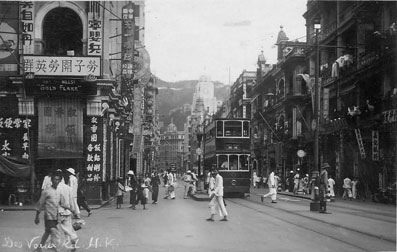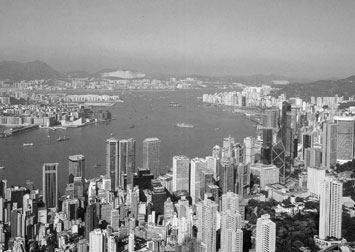The strange saga of Hong Kong
by Padma EDIRISINGHE
It was as an air passenger, transit, that I got a chance to enter
Hong Kong way back in 1991. Just seven years prior to the famous
transfer it was then one of the few colonial outposts of the British.
This transfer is hyped as follows.
|

Hong Kong then... |
"For the first time in history, a territory and its people are being
transferred from one sovereign power to another without a shot fired if
you leave out the Noon Day gun" (This is a ceremonial gun).
Just a very short stay yet the heaviness of an odd and curious
history of this outpost was almost touching me. The irreconcilables just
cried out. One was the chauffeur who drove me to a hotel uphill for my
night lodgings.
He looked the typical Chinese or Cheena (the term we used for the
Chinese cloth vendors who visited out homes in our childhood creating a
sensation in the village) but he spoke the most flawless English and his
conversation content, highly academic. Later I learnt that he was a
University lecturer by day, come night - turns into a tourist car
driver.
Meanwhile, as the car zig-zagged its way up, I just feasted my eyes
on the millions of neon lights that dazzled far down the city and around
the harbour and the waterfront beyond, later I learnt that the harbour
was named Victoria Harbour and that the waterfront belonged to Kowloon
ripped unceremoniously from China.
Why Victoria harbour reminiscent of our Victoria Park now Vihara Maha
Devi Park? It was during her reign, in the year 1842 that the British
annexed Hong Kong. She was amused, or more correctly her husband was
amused. She wrote to a friend that Albert was so much amused "at my
having got the island of Hong Kong", just a rocky dollop on the other
side of the world so barren and dry that even the Chinese did not
consider it habitable.
Barren island
How did I get these facts? No. Not during my two days there. Nineteen
years after my visit, in 2010, I happened to come upon a magazine put
out in 1997 commemorating the historical transfer. It includes articles
by well-known writers of HK. Here is Antony Spaeth," "In a few weeks 6.4
million of the most capitalist minded people on earth will surrender to
the world's last major communist State.
Governor Chris Patten will lower the Union Jack shortly before
midnight and along with the visiting Prince Charles steam away in the
royal yacht "Britannica". A fireworks display is expected above the
mirrored Hong Kong harbour with its nocturnal washes of neon from the
surrounding sky scrapers".
HK had become a British colony with a British naval party planting
the flag on it on January 26, 1842. That was about 27 years after we
came under the Suddha rule who had in several instances decided to
abandon HK as worthless through it appended Lanka strongly as a
strategic post. But unlike ours, its material progress since then has
been almost amazing since the time Palmerston declared it a barren
island with hardly a house on it reinforcing the depreciation by the
queen herself.

... and now
|
On to 1995 and we have this description of Hong Kong.
"Hong Kong is named the freest economy in the world... other economic
superlatives include having the world's busiest container port and fifth
largest foreign exchange market. How come the miraculous transformation?
Perhaps it lies in the oddness that any concerned visitor would
immediately notice. The Chinese in Hong Kong had gone their own way. Jan
Morris writes, "The British Empire at its most tremendous failed to make
much impression on this down to earth genius and the mass of Chinese are
not a lot less Chinese because they live beneath the Union Jack". They
all write that Hong Kong is a Chinese city and will always remain so.
The British mask could not cover the Chinese face of Hong Kong. So
what happens with the transfer? The mask will fall off altogether. Or is
it all so simple? Only time will tell.
Perhaps too much of a roseate picture has been drawn about the
colonial history of HK. No segregation? No discrimination of the
natives? No strutting of heavy boots of the Suddhas? Plenty there had
been. But here are the recipes for its astounding success. My father
used to say that Hong Kong was like a hard rubber ball - the harder you
threw it the harder it bounced back" - Lord Kadoorie, fabulously wealthy
HK business man.
"Hong Kong is actually as tough as old boots" - Baroness Dunn,
territory's most powerful woman valuing the resilience. "It has faced
challenges throughout its history which would have swamped less
resilient communities".
In 1844 the British colonial treasurer had again insulted HK calling
it a barren rock producing nothing, not leading to any place -
surrounded by no trading or populous communities". As late as 1939 the
prestigious Time magazine had declared HK to be virtually dead, almost
zeroed to the position of a negligible trade centre.
So the race to success seems to have been staged in between mid 20th
century and its later years, mainly piloted by private buccaneers of
fortune with sons and daughters carrying on the family businesses
faithfully. That is an evident mark in capitalist HK. But one must not
forget many a youth who have come up the hard way, alert to their own
talents and hell-bent on promoting them using resources available.
Ups and downs
The second world war too brought some glory to HK with Winston
Churchill himself raising its ego after the Japanese conquest of Canton.
"The eyes of the world are upon you. We expect you to resist to the end.
The honour of the Empire is in your hands". But came "dishonour" again
with a Japanese onslaught timed to coincide with the Pearl harbour
attack. So HK had its ups and downs like any other state but it had a
greater share of resilience, its chief hallmark.
In that magazine I found this blurb. 1997 - At midnight on July 1,
Hong Kong reverts to the People's Republic of China marking the end of
nearly 156 years of British rule. The ornate official seal is replaced
by one featuring the bauhiniya, a local flower".
As I read on, I thought of my taxi-man cum University lecturer of
1991. Informed that I am a writer cum Director of Education on my way to
attend a Children's Book Conference in China, he took the trouble to
walk into the lounge room of the hotel with me and chat foregoing
another taxi hire. He even revealed his plans for the future. He was
planning to leave to England. He studied in English and his children too
study in English. They do not know any Chinese nor any Chinese
literature. He has fears for the future. Perhaps he is out of the
ordinary flock for according to the magazine. Things are otherwise. Here
is a relevant quote.
"Change is an eternal assumption in Hong Kong-doted on, almost prayed
for, the way other places petition for rain and that is why the coming
twist in its destiny has failed to provoke terror" And this, "The Hong
Kong people are not going anywhere except into a large unfathomable
future. It is difficult to know what combination of virtues and talents
will be required for that journey.
"But if smart, pluck, grit and sharp elbows are of use, the
population of HK will be well-equipped", Anthony Speath.
|

